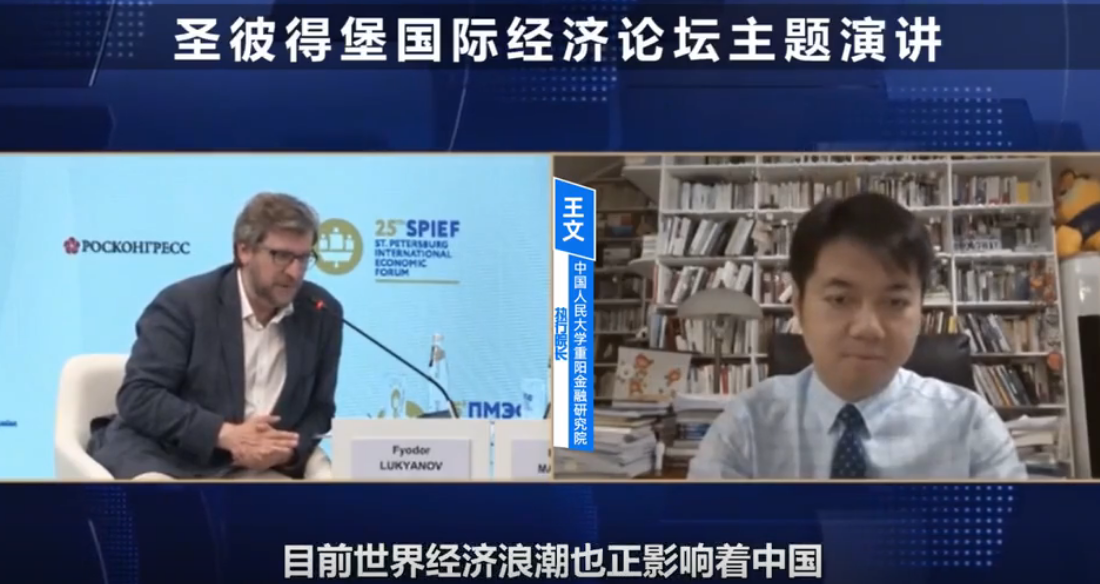LATEST INSIGHTS
Your Present Location: LATEST INSIGHTSWang Wen on SPIEF: New Issues in Political Economy
New Issues in Political Economy
---- Keynote presentation at the sub-forum "Self-sufficiency and Cooperation: New Forms of Political Economy" at the St. Petersburg Forum of the Valdai Club
June 16, 2022

Many thanks Valdai Club for having me again.
We did not expect that 40 years after the concept of "globalization" was proposed, the issue of "self-sufficiency" was still being discussed. This is truly a tragedy of world development and an ideological predicament of political economy.
Under the theoretical logic of political economy, through social division of labor and cooperation, the continuous growth of socialized production will inevitably break through the boundaries of a country and form a large world market. However, It is a pity that there are now signs of cracks and decoupling in the international markets of high-tech and energy commodities, leading to more and more people worrying about whether globalization would go backwards.
The risk of the possibility of retrogression in globalization is mainly due to the coercion of the United States. In recent years, the United States has used high-tech, dollars, and trade as weapons to block and sanction emerging countries such as Russia and China, forcing more and more developing countries to consider the issue of "self-sufficiency". From this perspective, the United States is the biggest troublemaker of globalization.
China is overtaking the US as the world's largest consumer market. Two years ago, China proposed the strategy of "building a new development pattern with the domestic cycle as the main body, the domestic & international dual cycles promoting each other", referred to as the "dual cycle strategy". China hopes to take advantage of its large domestic market to enable China to achieve independent innovation in key technological fields, such as large aircraft manufacturing, chips, car engines, etc., to reduce its dependence on the West, and to prevent the constant threats from the United States and promote more equal cooperation.
However, China's "dual circulation" strategy is not to return to a closed economy, nor a self-sufficient economy, nor to decouple from the West, but to better promote high-level opening and enhance economic autonomy through the advantages of a large domestic market, for example, expanding imports and rebalancing the relationship between trade and the economy.
In the theoretical framework of political economy with Chinese characteristics, globalization is an inevitable trend, especially in the era of digital economy, no one can stop economic globalization. Judging from the data of international trade, investment, flow of people and information, it is still showing a growth rate every year. China is a beneficiary of globalization, as well as a defender, builder and contributor.
At present, the changing trend of globalization that we need to think about is the speed of globalization and who will lead it? In this regard, I would like to share four points of view about new issues in Political Economy:
First, changes in the dynamics of globalization. In the past, the driving force of globalization originated from the West; now, it has turned to developing countries, especially the BRICS countries. In 2021, the BRICS countries grew by 7.6% year-on-year, which is higher than the global average growth rate of 5.5%. The contribution of BRICS growth to the world has exceeded 50% for 10 consecutive years. The growth rate of R&D investment, service trade, and infrastructure investment in emerging countries is higher than that of Western countries. Various data show that the BRICS countries are becoming a new locomotive of globalization.
Second, no country has the ability to completely block other countries. At present, the Western strategy of sanctioning Russia has failed. In the past 40 years, sanctions have not crushed Iran and North Korea, nor can they contain the development of China and Russia. Sanctions will only expose the selfishness of the West, and force emerging economies to pay more attention to self-sufficiency in technology and finance. From this perspective, "Western-centrism" will come to an end. The future globalization will be more balanced, more equal and more inclusive.
Third, prepare for the worst, think bottom-line, but try to keep the world from returning to a self-sufficient economy. In recent years, closed, confrontational and powerful political forces have emerged in the international order. The U.S. Indo-Pacific strategy further exacerbates the trend of camping. At present, we need to work hard to prevent "complete decoupling", to prevent a new world war, and to resist the repression of US hegemony. In this regard, emerging economies must promote localized substitution in key technologies and achieve necessary food and energy reserves independence, and at the same time, it is necessary to maintain the middle growth rate in terms of international cooperation in people, investment, and trade.
Fourth, it is necessary to have a broader vision, prevent future disasters on Earth, and explore a wider universe. One of the neglected reasons for the current tension between major powers is the limited global resources. The earth's resources are not enough to support the modern life of 8 billion people. The country's goal of competing for resources should turn to a wider universe and higher technological fields. Human beings should unite to explore space, explore new nuclear energy technologies, innovate low-carbon emission reduction technologies, and standardize AI technologies. This can not only prevent future climate crises, virus crises and food crises, but also save the future destiny of mankind.
Key Words: Wang Wen, China, Political, SPIEF























































































 京公网安备 11010802037854号
京公网安备 11010802037854号





